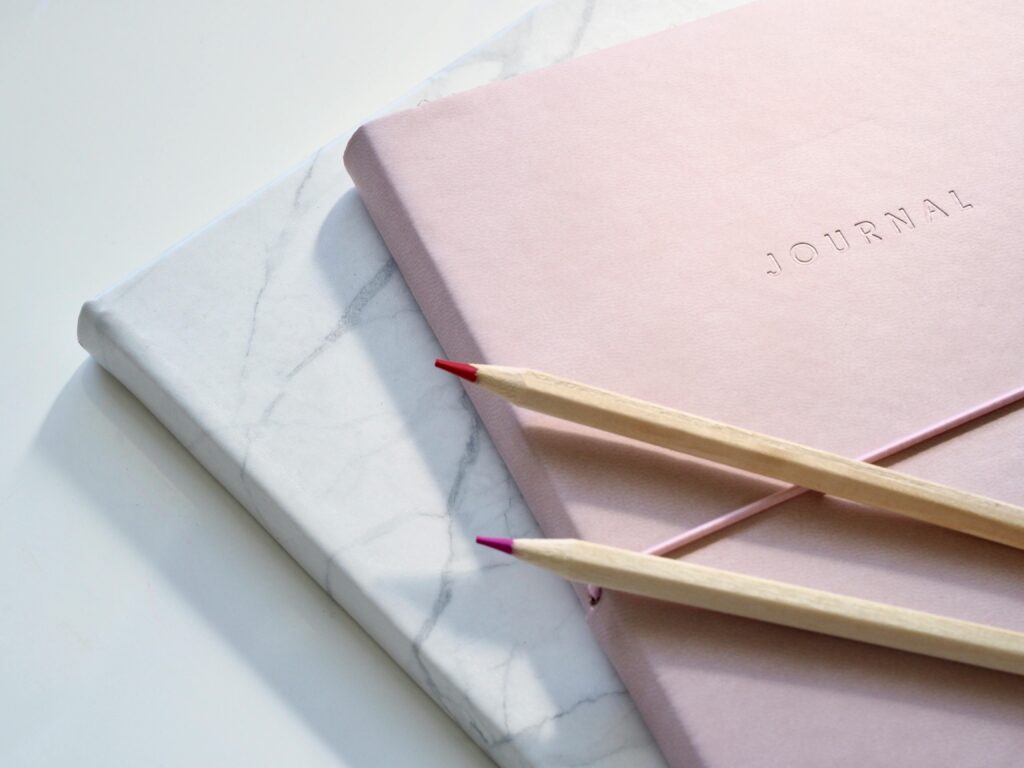APRIL 12, 2024
What is a mindfulness journal and how to start one

A mindfulness journal is a personal notebook or digital journaling tool used to cultivate mindfulness and self-awareness through reflective writing and introspection. It provides a structured space for people to explore their thoughts, emotions, experiences, and observations with present-moment awareness and non-judgment.
A mindfulness journal is beneficial because it helps with self-awareness, reduces stress, regulates emotions, cultivates gratitude, reinforces mindfulness practices, and goal setting, expresses creativity, and personal development, improves relationships, and documents progress.
Starting a mindfulness journal is a wonderful way to cultivate self-awareness, promote emotional well-being, and deepen mindfulness practice.
In this post, we will talk about what is a mindfulness journal and how to start one.
How to start a mindfulness journal
Here’s a step-by-step guide to help you get started with your mindfulness journal.
- Set Your Intentions
Begin by clarifying why you want to start a mindfulness journal. What do you hope to achieve or gain from this practice? Setting clear intentions can help guide your journaling process.
- Choose Your Journal
Select a journal or notebook that you feel drawn to. It could be a plain notebook, a beautifully designed journal, or even a digital journaling app—choose whatever format feels most comfortable and inspiring to you.
- Create a Sacred Space
Designate a quiet, comfortable space where you can journal without distractions. This could be a cozy corner of your home, a serene outdoor spot, or anywhere else that feels conducive to introspection.
- Set Aside Time
Schedule regular sessions for journaling, ideally at the same time each day. Whether it’s in the morning to set intentions for the day ahead or in the evening to reflect on your experiences, consistency is key.
- Begin with Mindful Breathing
Start each journaling session with a few minutes of mindful breathing to center yourself and cultivate presence. Close your eyes, focus on your breath, and notice the sensations as you inhale and exhale.
- Practice Gratitude
Begin your journaling session by expressing gratitude for the present moment and anything positive in your life. Write down three things you’re grateful for, no matter how big or small.
- Set an Intention
Before diving into your reflections, set an intention for your journaling practice. This could be a word, phrase, or affirmation that captures your focus for the session.
- Reflect on Your Experiences
Use your journal as a space to reflect on your thoughts, feelings, and experiences with openness and curiosity. Write freely without judgment, allowing whatever arises to flow onto the page.
- Focus on the Senses
Engage your senses as you journal by paying attention to the sights, sounds, smells, tastes, and sensations around you. Describe your observations in detail to deepen your connection to the present moment.
- Notice Patterns and Insights
Over time, you may start to notice patterns, insights, and recurring themes in your journal entries. Pay attention to these reflections—they can offer valuable insights into your thoughts, emotions, and behaviors.
- Practice Self-Compassion
Be kind and compassionate with yourself as you journal. Embrace imperfection and acknowledge that it’s okay to experience a range of thoughts and emotions.
- End with Reflection and Appreciation
Close each journaling session by reflecting on your experiences and expressing appreciation for the insights gained. Take a moment to acknowledge yourself for showing up and engaging in this practice.
- Review and Reflect
Periodically review your journal entries to track your progress, celebrate growth, and identify areas for further exploration. Reflect on how your mindfulness practice is influencing your daily life.
Now that you know how to start a mindfulness journal, we can have a look at the benefits of having a mindfulness journal.
The benefits of having a mindfulness journal
Having a mindfulness journal offers numerous benefits for mental, emotional, and spiritual well-being. Here are some key advantages:
- It increases Self-Awareness
Mindfulness journaling encourages self-reflection and introspection, leading to a deeper understanding of one’s thoughts, emotions, and behaviors. By regularly exploring inner experiences, you can gain insight into their patterns and tendencies, which encourages greater self-awareness.
- It reduces stress
Engaging in mindfulness journaling can help alleviate stress and anxiety by providing an outlet for processing emotions and thoughts. Writing about stressful experiences allows you to gain perspective, identify triggers, and develop healthy coping mechanisms.
- It enhances emotional regulation
Mindfulness journaling promotes emotional regulation by encouraging you to observe your emotions with curiosity and acceptance. Writing about feelings can help you recognize and acknowledge their emotions, leading to greater emotional resilience and well-being.
- It cultivates gratitude
Keeping a mindfulness journal often involves practicing gratitude, which has been shown to improve mood and overall happiness. Writing about things you’re thankful for encourages a positive mindset and helps you focus on the abundance in your lives.
- It promotes the practice of mindfulness
A mindfulness journal serves as a reminder to practice mindfulness regularly. By setting aside time for journaling, you reinforce their commitment to present-moment awareness and cultivate mindfulness in your daily lives.
- It clarifies thoughts and intentions
Writing in a mindfulness journal allows you to clarify your thoughts, intentions, and goals. By articulating your aspirations and desires on paper, you can gain clarity and direction, leading to more purposeful action.
- It documents progress
Over time, a mindfulness journal becomes a record of personal growth and development. Reviewing past entries allows you to track their progress, celebrate achievements, and identify areas for further exploration and improvement.
- It improves Problem-Solving Skills
Mindfulness journaling encourages you to approach challenges with a calm and open-minded attitude. By reflecting on problems in writing, you can generate new insights, explore alternative perspectives, and develop effective solutions.
- It promotes of Self-Compassion
Writing in a mindfulness journal will help with self-compassion and self-kindness. By treating yourself with warmth and understanding, you can cultivate a more compassionate relationship with yourself and others.
- It promotes Creative Expression
Mindfulness journaling offers a creative outlet for self-expression and exploration. Whether through writing, drawing, or other artistic means, you can express yourself authentically and tap into your creativity to deepen your mindfulness practice.
Conclusion
There’s no right or wrong way to start a mindfulness journal—what matters most is your commitment to showing up with openness, curiosity, and kindness.
Overall, having a mindfulness journal can support you in your journey toward greater self-awareness, emotional well-being, and personal growth. By incorporating regular journaling into your routine, you can cultivate mindfulness, develop resilience, and live more consciously and authentically.
Enjoy the journey of self-discovery and self-awareness that unfolds through your journaling practice.
Important: This post is for informational and educational purposes only. This post should not be taken as therapy advice, financial advice or used as a substitute for such. You should always speak to your own therapist or financial advisor before implementing this information on your own. Thank you!


